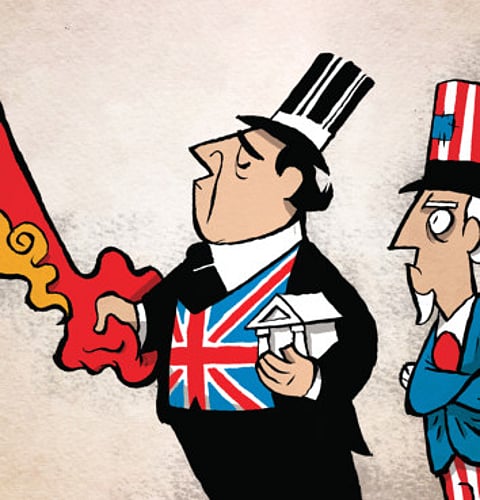Britain’s obsession with America’s wane
A sign of Britain’s likely stance to shifts in global power

Rome fell. Babylon fell. Hindhead’s turn will come.” George Bernard Shaw’s bon mot (good word) in Misalliance was a reminder to British theatre audiences in 1910 that all empires eventually decline and fall. The fact that Hindhead is an English village was a light-hearted cloak for a serious point.
As an Irishman, Shaw may have found it easier than the English to joke about the decline of the British empire. But, these days, it often falls to British academics based in America to play the role of the insider-outsider, commenting on the decline of today’s pre-eminent global power, the US. In the long-running debate about the future of American power, some of the most influential “declinists” are British historians working at American universities: Paul Kennedy at Yale, Niall Ferguson at Harvard and Ian Morris at Stanford.
This British tendency to believe that America’s “empire” will decline is more than just a curiosity of intellectual debate. It also has real-world effects. Behind the scenes, many British policy-makers also seem to be operating on the assumption that the continuing rise of China and the relative decline of America are both inevitable. As a result, they are making decisions that reflect a cautious adaptation to this wind of change. Britain’s recent decision to defy Washington and join the China-led Asian Infrastructure Investment Bank (AIIB) is one straw in that wind.
The British “declinists” have also had a big impact on America’s own debate about the future. Kennedy’s The Rise and Fall of the Great Powers was a best-seller in the US when it came out in 1987 and has shaped the discussion ever since. In the late 1980s, an era of high budget deficits and industrial decline, his argument that America — like Spain and Britain before it — would succumb to “imperial overstretch” seemed particularly persuasive. Paraphrasing Shaw, he predicted: “Rome fell; Babylon fell; Scarsdale’s turn will come.”
Ferguson, a historian of the British empire and much else, has also become a public intellectual in the US. His Colossus: Rise and Fall of the American Empire, came out in 2004, just as America was becoming bogged down in Iraq. Subsequently, Ferguson has argued: “The 21st century will belong to China.”
The third member of this triumvirate of declinist Brits, Ian Morris, caused a stir with his book Why the West Rules — For Now (2010). He too is preoccupied by the rise and fall of empires, and draws parallels between modern America and Edwardian Britain.
It is possible that British professors based in America have the right combination of knowledge and detachment to have an unclouded vision of America’s future. Alternatively, it is also possible that they may be over-projecting the fate of the British empire on to its rather more robust American successor. Joseph Nye, a professor at Harvard (and an American) points out that: “By the outbreak of World War I, Britain ranked only fourth among the great powers ... in GDP, and third in military spending.” By contrast, America still has the largest or second-largest economy in the world (depending on the measure you choose) and easily the biggest military budget.
What is more, the collapse of the British empire was precipitated by the draining effects of two World Wars, which left the UK close to bankrupt. If the US can avoid being sucked into a similar global conflict, it should do a better job of preserving its power.
But even if the Brits are wrong to project their own past on to America’s future, the habit is deeply ingrained. I have seen it myself. At one recent event, a retiring British mandarin waxed eloquent on the decline of his country’s influence over the course of his career, before predicting that the next generation would see a similar decline in American power. At another dinner, a British minister told a visitor from Washington that the US would eventually have to pull back from the western Pacific, just as Britain had once withdrawn from “east of Aden”. His astonished guest simply shook his head.
The implication of this kind of thinking for British policy, and western solidarity, is only just beginning to emerge. As British decolonisation gathered pace in the 1960s and America’s power rose, Harold Macmillan, a prime minister of the time, suggested that the Brits might be able to play the role of the wise, declining Greeks to the Americans’ robust, rising Romans. But now that the British sense that Rome-Washington might be on the wane, they are beginning to adjust once again.
The British have a history of making pragmatic adjustments. In response to the loss of empire, the Macmillan government weakened ties with Britain’s former colonies in the Commonwealth in favour of attaching themselves to a new rising power, which — back then — seemed to be the European Economic Community. Although some conservatives complained about the abandonment of “kith and kin” in the Commonwealth, commercial and political considerations weighed more heavily.
Britain’s decision to join the Beijing-based AIIB is a much smaller and less significant move than the decision to “join Europe”. It is a hedge against the future, rather than a repudiation of the special relationship with Washington. Nonetheless, it is also a small sign of how Britain is likely to respond to shifts in global power in the coming decades. They do not call Britons “perfidious Albion” for nothing.
— Financial Times


